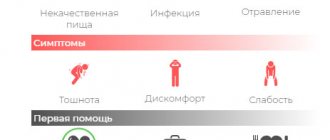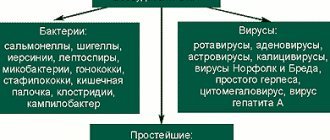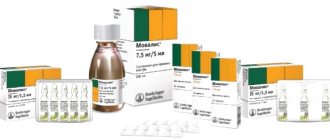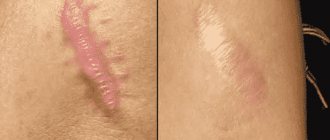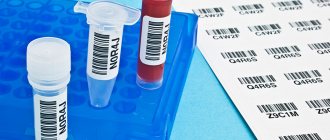When to see a doctor
Spasms in the intestines are quite “recognizable” - attacks of cramping pain in the left or right side, in the navel area. But they are often accompanied by other symptoms:
- bloating,
- flatulence,
- heartburn and/or belching,
- stool disorders (diarrhea, constipation or alternation of these conditions),
- abdominal pain during bowel movements or immediately after going to the toilet,
- nervous spasms of the intestines that occur only under conditions of excessive mental stress.
Severe intestinal spasms left untreated can lead to severe digestive disorders and even cause emergency conditions (for example, acute intestinal obstruction). It is important not to delay your visit to the doctor and undergo timely diagnosis and treatment.
“The First Family Clinic of St. Petersburg” offers you the attention and experience of highly qualified gastroenterologists who provide consultations in our multidisciplinary centers in the Primorsky and Petrogradsky districts of St. Petersburg. Make an appointment online or by calling the numbers listed on the website.
How to understand that a baby has colic: symptoms of intestinal problems
Colic in children can be expressed in bouts of crying (they often occur in the evening), tension and bloating in the abdomen, tightening of the knees, arching of the whole body, redness of the face, and refusal to eat. Usually, with colic, a child does not calm down if you pick him up and rock him to sleep. Breastfeeding can have an effect, but not for long, usually after the end of milk intake, the baby continues to cry.
Colic can also manifest itself as:
- anxiety for no reason;
- difficulty with stool;
- sharp cries during feeding;
- flatulence.
Often colic is accompanied by acne, similar to teenage ones. This is due to the fact that during the period of colic, the mother’s hormones received in the womb leave the child’s body. Hormonal balance is disrupted.
Diagnostic methods for spasms and pain in the intestines
Frequent spasms of the intestinal muscles can signal a number of organic and functional disorders. This requires an integrated approach to diagnosis for a comprehensive assessment of the condition of the gastrointestinal tract. Based on the collected medical history, the following examination methods may be prescribed:
- laboratory tests of stool, including for dysbacteriosis;
- blood and urine tests (including pancreatic enzyme tests);
- Ultrasound of the abdominal cavity, liver, gall bladder;
- gastroduodenoscopy;
- colonoscopy.
Considering that intestinal pain and intestinal colic can “mask” diseases of other abdominal and pelvic organs, consultations with other specialists are recommended. Thus, an examination by a gynecologist for women can exclude pathologies of the reproductive organs, and a consultation with a urologist can exclude kidney disease.
Intestinal spasm
Cramping pain, characteristic of intestinal spasm, can occur due to disturbances in various mechanisms of intestinal motility. The main links in the pathogenesis of intestinal spasm: overstretching of the intestinal wall, irritation of nerve endings, disturbance of the tone of the smooth muscles of the intestine with a disorder in the mechanisms of its contraction, the occurrence of pathological peristalsis (antiperistalsis, weakening or strengthening of peristaltic waves, disappearance of peristalsis in some parts of the intestine), the occurrence of an obstacle to promote the food bolus.
Intestinal spasms can occur against the background of digestive disorders - acute and chronic gastritis, stomach and duodenal ulcers, hepatitis, pancreatitis, etc. In case of disturbances in the digestion of food in the stomach and initial parts of the intestines, an untreated bolus of food enters the intestines and causes excessive irritation of its receptors, muscle spasm . Another common cause of intestinal spasms is errors in nutrition - the mechanism of development of colic is the same as with digestive disorders, but irritation of the intestinal wall occurs from too cold, spicy, fried, dry, stale food, products made from yeast dough, etc.
Intestinal colic can also develop due to intoxication - with generalized viral infections (influenza, ARVI), poisoning with industrial and plant poisons, salts of heavy metals. In these cases, intestinal spasm occurs due to the effects of poisons and toxins on the neuromuscular apparatus of the intestine. Intestinal infections can also be the cause of this pathology: the proliferation of bacteria in the intestinal lumen has a complex effect, causing irritation of nerve endings, excessive exudation with overstretching of the intestinal wall, and disturbances in peristalsis.
Asthenic people with a labile psyche, prone to strong emotions, often experience cramping abdominal pain associated with intestinal spasms during stressful situations. During emotional shocks, the autonomic regulation of intestinal motility is disrupted.
Intestinal spasm is also characteristic of helminth infections: worms parasitizing in the digestive tube are able to gather into balls and conglomerates that block the lumen of the intestinal tube. In addition, the helminths themselves and their metabolic products irritate the nerve endings in the mucous membrane.
With intestinal obstruction, spastic contractions of the intestinal muscles are also possible. Spasm most often occurs against the background of intestinal obstruction by a tumor, foreign body, coprolites and gallstones, helminth balls, and bezoars. There are frequent cases of the development of intestinal colic in adhesive intestinal obstruction that occurs against the background of inflammatory diseases of the abdominal cavity and pelvis, surgical interventions, and radiation. The intestines try to overcome the obstacle by gradually increasing peristalsis, which ultimately leads to spasm.
Depending on the cause and location of the pathological process, separate types of intestinal spasm are distinguished. The appendicular type develops in the presence of an inflammatory process in the appendix. Usually, some time after appendicular colic, a clinical picture of appendicitis appears. The rectal type is associated with spasm of the rectum and is manifested by a frequent strong urge to defecate. The lead type of intestinal spasm accompanies lead poisoning, which is characterized by high fever, tension in the anterior abdominal wall, gray plaque on the gums, and bleeding from the mouth. The vascular type is associated with intestinal hypoperfusion against the background of a hypertensive crisis, atherosclerosis, thrombosis of mesenteric veins, compression of blood vessels by a tumor or adhesions.
Treatment of intestines for spasms and pain
What to do with intestinal colic in the abdomen, the doctor decides based on the results of the examination, medical history, taking into account the age and general health of the patient - treatment for an adult and a child can differ significantly.
During therapy the following directions can be used:
- drug treatment aimed at eliminating symptoms, normalizing the balance of microflora and intestinal motility, restoring the enzymatic function of the pancreas and other disorders identified during the examination;
- surgical treatment in cases where the patient has structural changes in the large or small intestine, multiple polyps or other neoplasms that interfere with the normal functioning of the organ;
- diet therapy, the purpose of which is to facilitate the work of the intestines as much as possible for its speedy recovery and eliminate factors leading to irritation of its walls.
The treatment package is selected exclusively individually, taking into account the causes and complications of the disease, as well as its clinical manifestations. Therefore, specialists of a narrow profile - a gynecologist, urologist, endocrinologist - can take part in the formation of a therapy program. If intestinal spasms due to nerves are detected, treatment includes consultations with a clinical psychologist, and in case of intestinal innervation disorders, a neurologist.
What is colic and how does it manifest itself?
Colic (from Latin colica, “intestinal disease”) is a painful sensation that is usually associated with spastic activity of the intestinal walls. Colic is not a separate disease, and often indicates problems in the gastrointestinal tract1. One of the problems may be intestinal dysfunction, which in addition to colic may also manifest itself as pain, cramping, bloating, diarrhea or constipation. This may indicate that the intestines are irritated. We'll talk about why this happens below.
Intestinal colic can occur in response to changes in a person's lifestyle, for example:
- errors in nutrition, snacking on the go (irregular meals, frequent consumption of fast food, consumption of spicy, fatty, smoked and fried foods);
- eating foods containing large amounts of yeast (kvass, sauerkraut, etc.);
- frequent stressful situations and psychological sensitivity;
- past intestinal infections 2.
External factors can lead not only to a feeling of discomfort and colic, but also to disruption of the intestines. And when the intestines do not work properly, it shows this with problems such as spasms, pain, bowel movements or bloating2. Intestinal dysfunction occurs when its walls are spasmed, and therefore the motor function of the intestine as a whole fails. As a result, the intestinal walls move the contents either too slowly or, conversely, too quickly. We see constipation or diarrhea as symptoms of such a failure2.
Disease prevention
Preventive measures for colic in children come down to monitoring the nutrition of the nursing mother and following other pediatrician’s instructions from the first days of life.
During the first year of a child's life, it is especially important to regularly visit a qualified pediatrician and follow all his instructions. Doctors at the pediatric medical department have the necessary qualifications and experience to treat the youngest patients. If your baby experiences anxiety, often cries and sleeps poorly, then consult a pediatrician at SM-Clinic.
Sources:
- N.I. Ursova. Infantile intestinal colic. Modern data // Issues of modern pediatrics, 2011, vol. 10, no. 2, pp. 125-131.
- I.A. Belyaeva. Intestinal colic in newborns and infants: from diagnostic issues to differentiated correction // Issues of modern pediatrics, 2011, v. 10, no. 2, pp. 137-140.
- E.S. Keshishyan, Doctor of Medical Sciences, Professor, E.K. Berdnikova. Functional intestinal colic. Tactics for their correction in young children // Medical Council, 2013, pp. 106-109.
Grek Elena Anatolyevna Clinic
Author of the article
Grek Elena Anatolyevna
Doctor of the highest qualification category
Specialty: gastroenterologist
Experience: 23 years
The information in this article is provided for reference purposes and does not replace advice from a qualified professional. Don't self-medicate! At the first signs of illness, you should consult a doctor.
Signs of acute colic
Usually, during an attack, the child screams shrilly and unexpectedly , and shows extreme anxiety during feeding. Until the attack ends, it is almost impossible to calm the baby down - neither motion sickness, nor changing clothes, nor regurgitation help. Source: I.A. Belyaeva Intestinal colic in newborns and infants: from diagnostic issues to differentiated correction Issues of modern pediatrics, 2011, v. 10, no. 2, pp. 137-140. Lying in bed, the child tosses and turns from side to side, clenches his fists, and may blush or turn pale. You can see a “grimace of pain” on his face. The abdominal muscles become stiff and tense, which can be felt when touched. You can see bloating in the abdomen, the child is passing gas in large quantities.
Colic as a symptom
Although in medicine it is not customary to call colic either a disease or a symptom, they do occur against the background of other diseases. That is why it is imperative to show the child to the pediatrician to rule out:
- intestinal spasm;
- intestinal obstruction;
- flatulence;
- abnormal development of the gastrointestinal tract;
- disruption of the digestion process;
- lactase deficiency;
- allergies.
How to help a child when he is sick and what to do? Treatment methods
There is no clear treatment for colic in children, but pediatricians advise the following:
- abdominal massage after feeding;
- gymnastics (pressing your legs to your stomach);
- after feeding, you need to carry the baby upright for fifteen minutes so that he burps;
- place the baby on his stomach. Source: E.S. Keshishyan, Doctor of Medical Sciences, Professor, E.K. Berdnikova Functional intestinal colic. Tactics for their correction in young children // Medical Council, 2013, pp. 106-109
In some cases, your doctor may recommend using a special gas tube.
If the colic is severe, then a gas tube may be used.
Medical pediatricians will teach you how to properly give your baby a breast or a bottle so that he does not swallow excess air when feeding. Correcting the nutrition of a nursing mother is also important. The list of prohibited products is compiled together with the attending physician.
In some cases, doctors recommend taking medications to stabilize the child’s condition. Specific prescriptions depend on the identified causes of the child’s anxiety.
The following medications are often prescribed:
- probiotics;
- sedatives;
- medications for dysbacteriosis;
- preparations with enzymes.
What can you give a child for colic?
- Herbal carminatives.
- Enzyme preparations.
- "Espumizan" if the cause is flatulence.
- Dill decoction when colic is caused by gases.
- Herbal preparation "Plantex".
- Defoamers based on simenticon (when the cause is flatulence due to foaming in the intestines). These are “Espumizan L”, “Sab Simplex”, “Bobotik”.
- No-Spa will help relieve spasms.
- If the cause is a microflora disorder, then probiotics are given, for example Lactobacillus reuteri.
